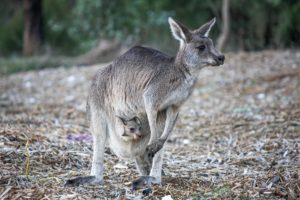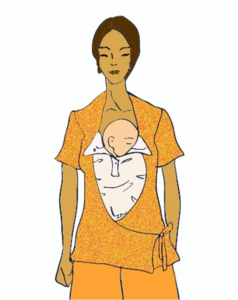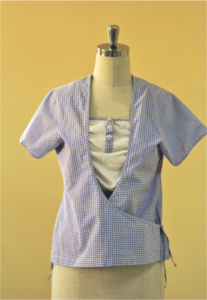
World University of Design along with IIT New Delhi and AIIMS create ‘Mamma Pod’ garment
 New Delhi: A kangaroo pouch may look like a simple pocket, but it’s in fact a complex nursery specially designed to protect a growing joey! Now taking a cue from the kangaroo pouch, a team of Delhi-based researchers have designed a ‘Kangaroo Mother Care’, which they have given the name, ‘Mamma Pod’. The developers describe ‘Mamma Pod’ as an assistive garment for giving ‘Kangaroo Mother Care’, which offers “a great opportunity” to minimise neonatal mortality by as much as 51% if channelized to mothers across India by primary health care centres.
New Delhi: A kangaroo pouch may look like a simple pocket, but it’s in fact a complex nursery specially designed to protect a growing joey! Now taking a cue from the kangaroo pouch, a team of Delhi-based researchers have designed a ‘Kangaroo Mother Care’, which they have given the name, ‘Mamma Pod’. The developers describe ‘Mamma Pod’ as an assistive garment for giving ‘Kangaroo Mother Care’, which offers “a great opportunity” to minimise neonatal mortality by as much as 51% if channelized to mothers across India by primary health care centres.

As the name suggests, ‘Kangaroo Mother Care’ or KMC draws inspiration from kangaroos who keep their newborns safely in the pouch whilst carrying out their life activities from feeding to hopping and even sleeping. It helps a mother to keep her child in close contact with her and carry on with the multiple chores at hand without feeling the usual fatigue.
Realising how in absence of care low birth weight babies find it difficult to survive, and looking at the example of kangaroo, Prof. Deepti Gupta at Department of Textile and Fibre Engineering at IIT, New Delhi and Dr. Ramesh Agarwal at Neonatology division of Department of Pediatrics, All India Institute of Medical Sciences, in collaboration with design maestros at World University of Design, came up with the idea of developing ‘Mamma Pod’ – an ergonomically designed innovative carrier to keep the neonate securely in contact with the mother’s skin, helping the baby to stay warm and supported.
 The path-breaking design of ‘Mamma Pod’ allows anyone and everyone to use the garment and is as good in the rural setting as much as it is in the urban setup, and the product has been selected for the “Biotech Product and Process Development and Commercialization Awards 2020” by the Government of India.
The path-breaking design of ‘Mamma Pod’ allows anyone and everyone to use the garment and is as good in the rural setting as much as it is in the urban setup, and the product has been selected for the “Biotech Product and Process Development and Commercialization Awards 2020” by the Government of India.
The pod finds maximum use in areas where ICU and incubation facilities are either not available or insufficiently available. Areas where facilities exist but face electricity shortage would also find extensive use of this assistive device. Dr. Deepti Gupta, the project leader, put the problem is perspective saying – “In a developing country like ours, neonatal deaths have been recorded to be as huge a number as 750,000 as per studies in 2017 and most of them are due to pre-term births and infections contracted while being in the medical facility. The lack of basic amenities for neonates in medical care due to low funding may not be tackled with as quickly but Mamma Pod offers a brisk, economical and effective solution for babies until they weigh 2kgs.”
Elaborating on how it was different from the slings and carriers available in the market for new mothers, Dr. Sanjay Gupta, vice chancellor of the World University of Design, said, “Unlike other carriers, Mamma Pod can be worn without assistance by the mother herself and is designed to not only keep the baby secure and cocooned between mother’s breasts but also to distribute baby’s weight across the shoulders enabling long hours of KMC.”
Dr. Gupta claimed that using Mamma Pod KMC could easily be given for the required 18-20 hours a day which is crucial for a rapid weight gain by the baby. “It caters to the most delicate of all stages in the life of a newborn, the neonatal phase when the baby needs the maximum support and essential care to substantiate itself,” he explained.
– global bihari bureau





